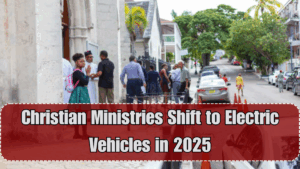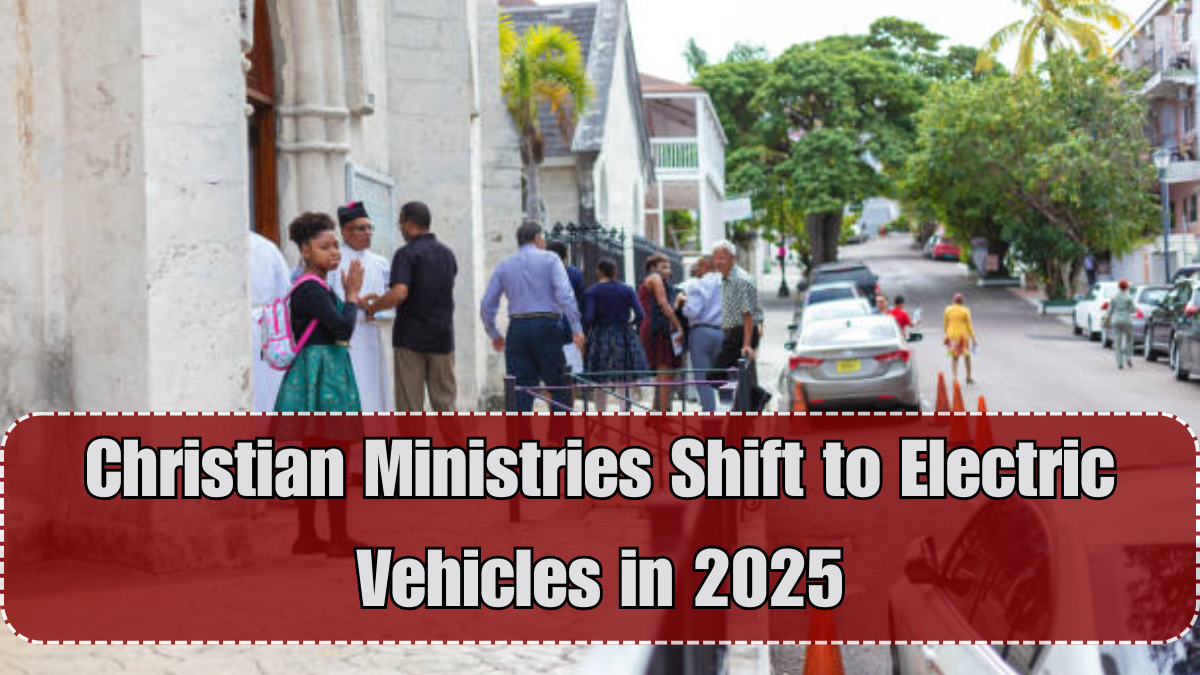A wave of sustainability has swept across faith-based communities as EV adoption in Christian NGOs becomes the new norm in 2025. From mission vans to outreach transport, Christian ministries across India and other countries are replacing diesel-run vehicles with eco-friendly electric alternatives.
The shift toward electric vehicles (EVs) comes in response to rising fuel costs, environmental concerns, and the availability of new government grants supporting green mobility for non-profit organizations. Today, hundreds of ministries and religious NGOs are leading by example, combining stewardship with sustainability.
Let’s explore how this green transition is reshaping the way Christian organizations serve communities across India and beyond.

Why Are Christian NGOs Choosing EVs?
The adoption of EVs by Christian ministries isn’t just a logistical upgrade — it’s a values-driven decision rooted in environmental responsibility, stewardship, and long-term financial savings.
Key reasons for EV adoption in Christian NGOs:
-
Zero tailpipe emissions supporting environmental care
-
Fuel cost savings of up to 80%
-
Low maintenance and longer service life
-
Access to government EV grants and subsidies
-
Reduced noise pollution during rural missions
-
Alignment with the biblical concept of caretaking the Earth
With EV adoption in Christian NGOs gaining momentum, many are also educating congregations and youth on the importance of ecological responsibility.
How Ministries Are Transitioning to EVs in 2025
Several faith-based organizations have taken a strategic approach to integrate EVs into their regular operations.
Common transition steps include:
-
Retiring diesel vans after reaching mileage thresholds
-
Partnering with EV dealers for special NGO discounts
-
Training drivers for electric vehicle handling and charging
-
Applying for Green NGO Transport Grants
-
Setting up EV charging points in churches and mission centers
The transition has been widely supported by local dioceses, pastors, and NGO leaders who view EV adoption in Christian NGOs as a necessary and timely change.
Table: Benefits of EVs vs Diesel Vans for Christian NGOs
| Feature | Diesel Vans | Electric Vehicles (2025) |
|---|---|---|
| Fuel Cost | ₹90–₹95/litre | ₹1.5–₹2/km (charging) |
| Maintenance | High (engine, oil, filters) | Low (fewer moving parts) |
| Emissions | High carbon footprint | Zero tailpipe emissions |
| Noise | Loud | Ultra-quiet operation |
| Grants/Subsidies | None | Government & state NGO schemes |
| Ideal For | Short trips only | Urban + rural mission coverage |
As more ministries realize the operational and ethical advantages, EV adoption in Christian NGOs is steadily becoming mainstream.
Real-World Examples from the Christian Community
In 2025, numerous Indian and global Christian organizations have adopted EVs:
-
Mission India Trust deployed electric vans for tribal outreach in Chhattisgarh
-
Catholic Social Services in Kerala transitioned 50% of its vehicles to EVs
-
Youth With A Mission (YWAM) chapters in Tamil Nadu started using electric bikes for street ministry
-
Baptist Relief NGOs in Andhra Pradesh received state EV subsidies for van upgrades
The momentum is expected to grow as more NGOs qualify for green vehicle incentives under the latest Ministry of Road Transport guidelines.
FAQs
What does EV adoption in Christian NGOs mean?
It refers to Christian ministries and non-profit religious organizations using electric vehicles for their transport and outreach activities.
Why are Christian organizations switching to EVs?
Due to their environmental mission, lower costs, and access to new EV subsidies tailored for NGOs and social work.
Do these NGOs receive financial support?
Yes, many qualify for green transport subsidies, especially under the Ministry of Social Justice and State EV Promotion Schemes.
Are EVs suitable for rural ministry work?
Absolutely. New EV models offer longer range and better ground clearance, making them ideal for village and tribal missions.
Can small churches also benefit from this movement?
Yes, even smaller ministries can lease or partner with EV providers through cooperative church programs or mission alliances.
Click here to know more.
